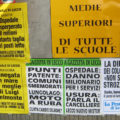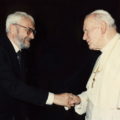To my regular readers: Not too long ago, I (and thousands of others) stumbled across an article titled Atheists and Anger, an articulate, well-thought-out piece which I highly recommend. It had the welcome side effect of introducing me to the wonderful writing of Greta Christina. (Whose themes range far beyond atheism and are not for everybody… read at your own risk. In case you end up wondering: no, I am not into spanking.)
It was on Greta Christina’s blog that I learned about a new way to share love and traffic among like-minded blogs, called a BlogCarnival. My own piece on Raising a Non-Believer was hosted soon thereafter by The Humanist Symposium, and now I’m doing my bit in return.
The themes of the articles below may include (according to the guidelines):
- The happiness and freedom of life as an atheist, or other positive aspects to living a life without religious belief
- Efforts to evangelize for atheism, and stories of people who have recently deconverted from religion
- How to find meaning and purpose in a godless life
- How non-religious people deal with weddings, child-raising, deaths, and other significant life events
- Posts that stir up the human sense of awe and wonder
- The ethics and moral philosophy of the non-religious
- How nonbelievers can foster and nourish a sense of community
Here, without further ado, are the articles. The quotes below each are their authors’ descriptions, where such were provided.
Greta Christina presents The Meaning of Death, Part 2 of Many: Motivation and Mid-Life Crises posted at Greta Christina’s Blog:
“In a world with no God and no afterlife, death — like life — doesn’t have any purpose or meaning except the meaning we create. So what meaning can we create for it? Here is one idea: death as a deadline, for those of us who are deadline-driven.”
Phil for Humanity presents The Blame Game << Phil for Humanity posted at Phil for Humanity:
“Recently, I heard a racial slur against Jews because of what they
supposedly did to Jesus Christ. This insult was not against the Jews
that were alive two thousand years ago but against the Jews living
today.”
Samuel Bryson presents The Meaning of life (and other trivial concerns!)- An Existentialist Approach: posted at Total Wellbeing.
Alonzo Fyfe presents E2.0: David Sloan Wilson: New Atheism a Stealth Religion posted at Atheist Ethicist.
KC presents Speak now, speak loudly and speak often posted at Bligbi.
Chris Hallquist presents Review: On Truth posted at The Uncredible Hallq.
Albert Foong presents The life that has gone on before: The Perils of Compassion, Part 2 posted at Urban Monk.
The Sacred Slut presents Beside the Point, posted at A Whore in the Temple of Reason.
Ron Brown presents Finding meaning in wonder and well-being: An ex-fundamentalist’s tale « The Frame Problem posted at The Frame Problem.
vjack presents Atheist Spirituality posted at Atheist Revolution:
Can an atheist be a spiritual person, and if so, in what sense? Is it meaningful to talk of atheist spirituality, or should the term be reserved for religious believers?
Mike White presents How much Freedom do we Have? posted at Life According to Mike White.
An adventure into how much freedom as humans we actually have. How does religion affect our freedom, how morality is affected through our choices and attention taken to our inner self. I think this might be a long one!
plonkee presents violence and incompetence posted at the religious atheist:
It’s funny, but I’ve always heard that you get more conservative, traditional and right wing as you get older, whereas I seem to be getting more pacifist.
John Remy presents For Atheists and Agnostics Who Go To Church | Mind on Fire. posted at Mind on Fire..
From D: I haven’t had time to write anything new myself this week that fits the theme, but those who are new to my site can check out the links on the left for some older musings of mine on atheism.
Though it hasn’t been submitted as part of the Symposium, I strongly recommend that anyone interested in questions of morality and religion read Steven Pinker’s recent NYT article on The Moral Instinct.
The next Humanist Symposium will be Feb. 17 at Cafe Philos.








